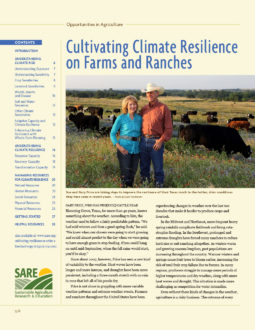General Resources
Extension Disaster Education Network (EDEN). A multi-state network of Extension professionals that offers research-based education resources on disaster preparedness and response.
Resilient Agriculture: Cultivating Food Systems for a Changing Climate. Explores agricultural climate risk and resilience through the adaptation stories of 25 award-winning sustainable farmers and ranchers producing vegetables, fruits, nuts, grains and livestock products across America.
Climate Exposures—Regional
Historical Climate Trends database. State-by-state data on temperature and precipitation trends beginning in 1895, with seasonal and annual data available.
State Climate Summaries—NOAA National Centers for Environmental Information. National Oceanic and Atmospheric Administration (NOAA) state-by-state reports on historic climate trends, projections for the 21st century, and sea-level conditions and coastal flooding.
Vulnerability Assessments—USDA Regional Climate Hubs. These regional assessments report on regional climate exposures, sensitivities, adaptation and mitigation strategies for working lands.
Climate Risk Management—Regional
AgroClimate. Online decision tools to help farmers in the Southeast improve the climate resilience of their operation, from the University of Florida.
Cornell Climate Smart Farming Program. Online decision tools to help farmers in the Northeast improve the climate resilience of their operation.
Regional Approaches to Climate Change. This project was initiated to ensure sustainable cereal production in the inland Pacific Northwest and has produced a wide variety of resources to support agricultural adaptation to climate change in the region.
SustainableCorn.org: Crops, Climate, Culture and Change. Online tools and research to help Corn Belt growers adapt to changing climate conditions.
USDA Regional Climate Hubs. Offers tools, strategies, management options and technical support to farmers, ranchers and forest land owners to help them adapt to climate change.
Farm Planning and Resource Management
The Adaptation Workbook. An interactive, online adaptation planning tool for land managers. The tool guides users through a series of questions that explore the potential effects of climate change on their operation and how to develop a set of land-management and conservation actions that can help prepare for changing conditions. Northern Institute of Applied Climate Science.
FarmData. An online recordkeeping system designed especially for organic vegetable producers that allows users to keep production records related to seeding, transplanting, harvest, cover crops, compost, fertilization, irrigation, pest scouting, spray activities, packing, distribution and customer invoicing. Dickinson College.
Introduction to Risk Management: Understanding Agricultural Risks. Designed to improve the risk management skills of agricultural producers by introducing some basic risk management concepts and effective management tools. L. Crane et al. 2013. USDA Risk Management Agency.
Introduction to Whole Farm Planning: Combining Family, Profit and Environment. Briefly describes the four steps involved in this adaptive management approach to comprehensive planning, and recommends tools and resources. Minnesota Institute for Sustainable Agriculture.
Reading the Farm. An educational program that improves the ability of Extension professionals and others to give management advice to farmers and ranchers based on a whole-farm analysis of their operation. Northeast SARE and the University of Connecticut.
Natural Resource Management
Building Soils for Better Crops. This one-of-a-kind, practical guide to ecological soil management provides step-by-step information on soil-improving practices as well as in-depth background information on soil properties. SARE.
The Cover Crop Chart (v. 2.1). This chart includes information on 58 cover crop species that may be planted individually or in cocktail mixtures. Information on growth cycle, relative water use, plant architecture, seeding depth, forage quality, pollination characteristics and nutrient cycling are included for most crop species. M. Liebig, USDA ARS.
Cover Crops Topic Room. This online collection of educational materials was developed out of decades of SARE-funded cover crop research. SARE.
Diversifying Cropping Systems. This bulletin describes some of the many agronomic crop alternatives to use in rotations, with plentiful examples of on-farm successes. SARE.
Managing Cover Crops Profitably, 3rd Edition. This definitive book explores how and why cover crops work and provides all the information needed to incorporate cover crops into any farming operation. SARE.
The Midwest Cover Crops Council (MCCC). The MCCC cover crop selector tools are online systems that assist farmers in choosing cover crops for field crop and vegetable rotations.
